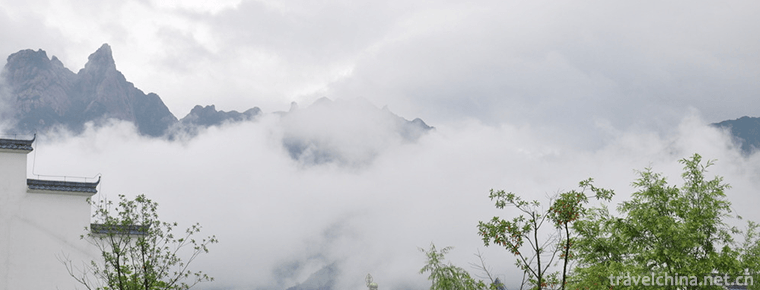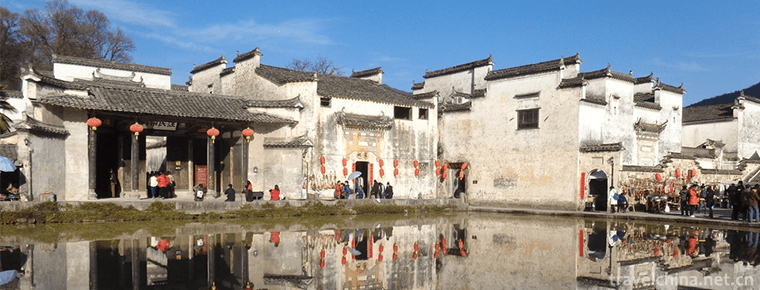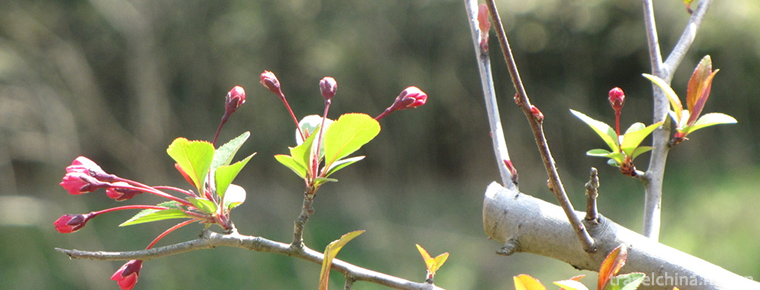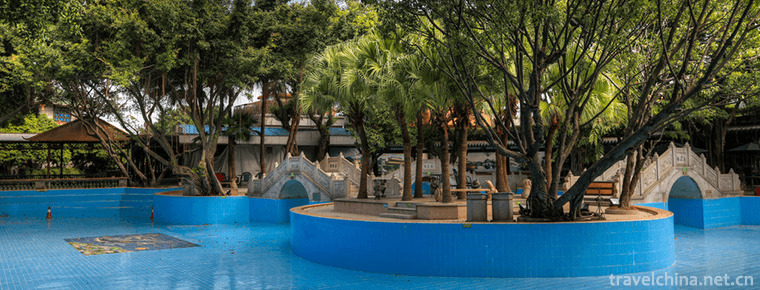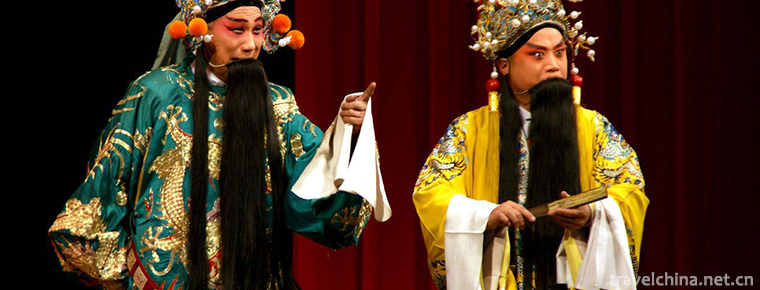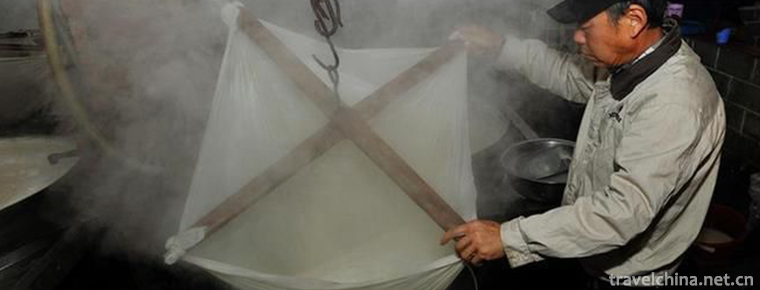Ping Tan drama
Ping Tan drama
Pingjiao Opera is a kind of high-pitched opera that sings opera and prose in local dialect. It is a unique local opera in Fujian Province. It was formed in the early Qing Dynasty, originated in Pingnan, and spread in Ningde and Fuzhou. Because both the lyrics and dialogues are in dialect and plain as speech, it is called "plain speaking opera", which is one of the predecessors of Fujian opera.
Pingzhuo Opera was formed by the evolution of Siping Opera's "Singing White Characters" popular in the late Ming and early Qing Dynasties, combined with Pingnan folk "Pian Story" performing art. At the end of the Qing Dynasty and the beginning of the Republic of China, Pingjiao Opera flourished for a while. Around the 26th year of the Republic of China (1937), the rural scenery declined. With the influx of new Fujian Opera, Pingjiao Opera declined. After the founding of the People's Republic of China, Pingjiao Opera once recovered.
Pingju opera mostly absorbs local folk songs and slang, and the performance content mostly expresses love, marriage and working life. The representative repertoires are "Shuangfeng Hou" and "Shuangzhuang Yuan". In addition, there are folding operas such as "Tower Club" and "Cloud Head Delivery Zi".
The music of Pingshuo Opera originates from folk songs, which absorbs Siping tune, teasing tune and foreign song with random play, and changes the tune or phrases with words. One person sings, and all the people are in harmony, gradually forming local characteristics. The main instruments are orchestra, flute, Beijing Hu, fish drum, hand drum, Gong and so on. The early instruments are simple and convenient. The characteristic instruments are knife sheath, moonless gong, moustache, flat bass gong, finger-tip and so on. Pingjiao opera roles are divided into Xiaosheng, Xiaodan, Laosheng, Dahua, and other industries, focusing on Xiaosheng, Xiaodan and Laosheng, so it is called "three small operas".
Historically, Pingjiao Opera was mostly based on the names of villages or class owners, such as Pan Guangman Class, Jishui Class and Tangxi Class.
On June 7, 2008, Pingnanping Lecture Theatre was approved by the State Council to be included in the second batch of national intangible cultural heritage list . In December 2014, the peace talk theatre declared by Fuan City of Fujian Province was listed in the fourth batch of national intangible cultural heritage list with the approval of the State Council.
History of Development
Pingjiao Opera, formed in the early Qing Dynasty, is one of the predecessors of Fujian Opera. It is popular in Fuzhou, Hou Min, Fuqing, Pingnan, Gutian, Ningde, Changle, Fuan, Zherong and other towns. The opera was first performed in the form of "underground shed". The actors dressed up as various roles in the play, played gongs and drums, and sang along the village. They also often drew straw ropes in circles in the Sunny Valley flat or in the open space of the street. The actors performed in the circle and the audience stood outside the circle, so the opera troupe was called "leading straw troupe" or "underground shack troupe". This kind of performance is mostly amateur and seasonal. The singing tone belongs to the "foreign song" tune. The Taobai dialect is in Fuzhou dialect, so it is called "Pingshuo opera", which is different from the Siping opera, Huidian opera, random play, Beijing opera and other foreign operas sung in official tone.
In the early years of the Qianlong reign of the Qing Dynasty, a peace workshop was organized in Xiechuo Village, Pingnan County. From the mid-Qing Dynasty to the Guangxu Period, the development and prosperity of ordinary lectures were in full swing. In Siping Village, Xiling Township, Pingnan County, there is a class of Pan surnamed Ping, which can be traced back to the class of Pan Guangmin. Following Pan Guangmin Ban is Pan Yongwan Ban, followed by Pan Yongwan Ban is Pan Yongyu Ban.
From Xianfeng in Qing Dynasty to the end of Tongzhi Period (1851-1874), 63 villages including Xie Kuo, Tianfeng, Shandun and Bitou were established in Pingnan alone. Even small villages with only 10 families, such as Dongshan Mountain, Bancun and Xinzhuyang, also held peace talks, with more than half of the villages distributed in Pingnan County. At that time, the more famous one was the "Yiheng Class" in Daixi Township, which was praised as "speaking one equally".
The period of Tongzhi and Guangxu in Qing Dynasty (1862-1908) was the most prosperous period of Pingju Opera. In Fuzhou, Baofa Class, Old Shimei Class, New Shimei Class and Three Shimei Class appeared one after another, all named after the class's famous characters.
In the second year of Xuantong reign of Qing Dynasty (1910), Yu Er-2 (nicknamed "Hotel II") of Lianjiang County invested 100 silver yuan. He hired Pinghao Opera Artists'Divisions in Fuzhou and set up a hall in the Yushi Temple of Lianjiang County. He recruited 13 rural children (the oldest was 16 years old and the youngest was 11 years old) and set up a "group music class" with Yu Er as the head of the class. The first performance of the class was "Nuwa Butian", and then learned more than 10 copies of "Blue Blind Watches Purdue" and performed in villages on both sides of the Aojiang River. It was very popular.
During the period of Xuantong (1909-1911), Pingjiao Opera began to merge with Confucian Opera and Jianghu Opera, commonly known as "the first three synergies", and began to form the embryonic form of Fujian Opera. Pingjiao Opera, as an independent voice opera, still existed in other counties and cities, but it has gradually declined.
In the two years of the Republic of China (1913), Wu Guangting, a literati in Lianjiang County, invited Wei Huali, a playwright and entertainer from Fuzhou, to set up a museum in the Runyu Palace. He recruited Wu Zhuoshan (Xiaosheng), Zhuangbazhao (Qingyi), Xie Yuqiu (Dahua), Confucian Tenth (Backstage), Xiong Wu 15 (Backstage) and other disciples from the city to rehearse "Pagoda Bye".《 Ziyuchai, Wang Zhaojun and Fan, etc. These repertoires are transplanted from Confucian Opera, which shows that Confucian Opera has been combined with Pingju Opera.
In the 7 years of the Republic of China (1918), Lin Damei of Tanghou Village, Yiyu of Changting Village and Donghu Village jointly founded Qitianle Class. The class performed Dragon and Phoenix Golden Ear Pick, Six Foreign Ministers, Chen Xiang Cave, Gan Guobao, etc. It also performed in Fuzhou, Changle, Fuqing, Ningde, Fuan and other places. It trained a number of artists such as "Keng Garden Sheng", "Ma Bidan" and "Huang Xiuqing (Lao Sheng). In particular,"Ma Bidan"was famous for"three flower drums a day".
In the 15 years of the Republic of China (1926), Zhang Daling, the owner of Buzhuang, Zherong County, funded the first amateur peace workshop in Zherong County, with 60 actors singing in Zherong dialect. During the period of the Republic of China, Fujian Opera had been formed, Pingju Opera was declining day by day, and these groups soon disappeared. After the founding of the People's Republic of China, Fujian Province had only four rural amateur theatres in Fuan, Xiapu, Ningde and Pingnan counties. In order to excavate and rescue this ancient local opera, from 1956 to 1964, many performances of rural literature and art were held in Fuan area (now Ningde area). The Xiapu County team performed the Ping Lecture "Giving the Mirror". The Fu'an County team performed the Ping Lecture "Sisters Watching the Flower Lantern", and the Ningde County team performed the Ping Lecture "The Cavalier of Straw Shoes". And other repertoire.
In March 1960, Fuan County set up the Pinghao Theatre Troupe. Old artists and young artists worked together to excavate and record 23 traditional operas and 23 tunes. They arranged and performed the Folk Opera such as "Picking Sang", "Giving Hair" and "Broken Bridge". In May 1960, they participated in the provincial youth opera performers'performance. In 1961, it was dissolved because of temporary difficulties in the national economy. After 1976, amateur theatre classes were resumed in Kangcuo Commune (township), Fengyang Brigade (village), Niushan Curving Brigade (village) and Waiyang Brigade (village) of Fuan County. Among them, there are 38 actors in Niushan Bend. From 1979 to the first half of 1981, they performed 216 performances.
In 1977, the CPC Central Committee reiterated the literary and artistic policy of "letting a hundred flowers blossom, weeding out the old and bringing forth the new". Pingnan opera flourished again and Pingnan opera revived, but it was only a flash in the pan. In the late 1980s, with the last amateur non-governmental organization, Siping Village, Xiling Township, Pingnan County, breaking up the class, Pingjiao Opera basically disappeared in the northeast of Fujian Province. Following the break-up of the class, Pingyao performers have changed careers, and some Pingyao performers have turned to random bullet show .
In 1990, Chen Fasong, the author of Eastern Fujian Province, created the modern drama "It Was You" .
In 2002, Pingnan County set up a local theatre research office. After making a thorough investigation of the local theatre reservations in Pingnan County, a special working group was organized to go deep into 32 key villages of Pingnan Opera, such as Beitou Village in Tangkou Township and Siping Village in Xiling Township, to conduct a thorough investigation and collect and collate information on Pingnan Opera.
In 2006, the Symposium on Chinese Siping Opera (Gaoqiang) was held in Pingnan. Zhang Xianlou, Zhang Xiandu and others gathered old performers of Pingtou Village and retired performers of Fujian Opera Troupe, reorganized the Pingtou Pingtou Drama Troupe and began to rehearse Pingtou Drama. While applying to the relevant departments of Pingnan County for participation in the seminar, they asked the Pingnan County Propaganda Department to help solve the problems of clothing and props .
On July 26, 2014, the unveiling ceremony of Fuchun Park's leisure corridor was held for the first "Pingjiu Opera Art Activity Base" in Fuan City. In order to better inherit and carry forward Fuan Ping Opera, Fuan City intends to build six "Ping Opera Art Activity Bases" .
Inheritance status
In 2006, Zhang Xianlou and others set up a group of more than ten old opera artists, mostly retired Fujian opera performers, some of whom had not even touched Pingnan Xiaotouping Theatre. In order to attract more people to learn Pingnan Opera, the Pingnan Opera Troupe also teaches Pingnan University for the Aged and teaches Pingnan Opera to its students free of charge, which attracts more than 20 elderly people to join the troupe. With the expansion of the team to more than 40 people, Pingjiu Opera began to perform in the countryside.
However, such a development model is ultimately unsustainable. For a night of performance in the countryside, the village gave a subsidy of 3000 yuan. After deducting all kinds of expenses, such as fare, meal and so on, performers are basically obligated to participate in the performance. At the same time, because the participants are elderly people, performing in the countryside is very hard, some old people began to withdraw. This model lasted for three years and ended in failure.
In 2012, local skills such as Pingnan Pingping Theatre were moved to the stage of Pingnan Baishuiyang Scenic Area. The performances not only increase the popularity of the scenic spots, but also find a market for local art. By 2014, more than 40 trainees had been enrolled, with an average age of about 40 years .
On June 30, 2014, the Peace Opera Training Base of Fuan Geriatric University was established. Municipal University of Geriatrics will carry out the training of peace-speaking theatre among its students, so that more students can know about Fu'anping opera and know about Fu'anping opera, so that this local opera with Fu'an characteristics can be inherited and developed .
Pingnan Biaotouping Theatre Troupe is the protection unit of Pingnan Pingping Theatre. In 2015, on the basis of the troupe, Pingnan County established Biaotouping Theatre Interpretation Institute of Pingnan County, registered as a corporate body, and engaged the national representative inheritor Zhang Xiandu, provincial representative inheritor Zhang Xianlou, and project inheritors to participate in the inheritance of art, and organized rehearsals of traditional plays, and carried out public welfare. Performances and foreign exchange performances, in 2015 also entered the stage to perform exchanges .
Meaning Value
Pingjiao Opera is a kind of high-pitched opera which directly absorbs the artistic characteristics of Siping Opera and preserves the cultural characteristics of original opera. Its repertoire, singing and performance all contain the artistic forms of ancient opera, especially its singing music, accompaniment and performance forms, which basically preserve the ancient features of high-pitched opera. It provides a reliable demonstration for the study of high-pitched opera and Siping Opera. Pingshuo Opera has a great relationship with the clan opera performance system in clan society. The formation of Pingshuo Opera Troupe and the performance of its repertoire are all cultural acts of clan people to safeguard the interests of the common people. From the point of clan drama, Pingshuo Opera provides an important reference system for the study of the relationship between Chinese folk Opera and clan in rural society .
Although Pingjiao Opera accepted part of the heritage of Siping Opera in Ming Dynasty, it adapted a large number of traditional operas according to the needs of local society and the audience's appreciation psychology in the process of its popularity, which is of great significance to the study of the development history of local operas. Pingjiao Opera has preserved many performance modes of ancient Southern Opera, and accumulated some performances of artists of past dynasties, such as Gemini Club, Gift Belt and Vegetable Sang, which are the best works polished by generations of artists, preserving the extremely precious aesthetic value of ancient opera, so that future generations can understand the true face of social life hundreds of years ago.
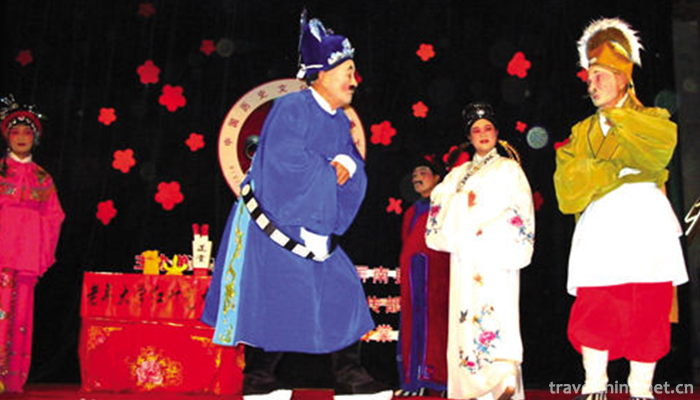
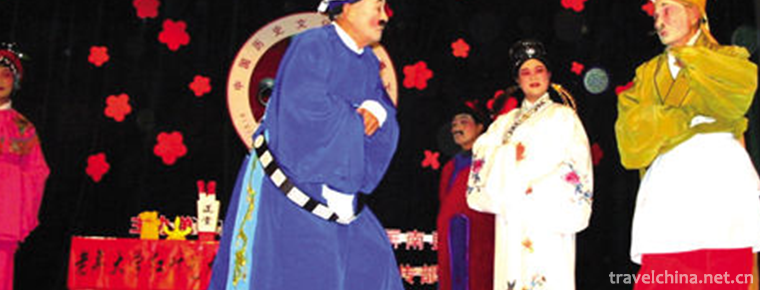
Ping Tan drama
-
Mount Jiuhua Scenic Area
Jiuhua Mountain Scenic Spot is located in Anhui Province, China. The northwest is across the Yangtze River and Tianzhu Mountain, and the Southeast
Views: 141 Time 2018-12-08 -
Ancient Villages in Southern AnhuiXidi and Hongcun
Ancient villages in southern Anhui refer to some traditional villages distributed in Anhui and Jiangxi provinces of China and south of the Yangtze River.
Views: 112 Time 2018-12-08 -
Gucun Park Shanghai
Gucun Park is located in Gucun Town, Baoshan District, from north to Shapu, south to Jiazaobang, and adjacent to Huanbei Avenue of the Outer Ring Road,
Views: 110 Time 2018-12-19 -
Qiankun Bay Scenic Area
Qian Kun Wan Scenic Area is located in Qian Kun Wan Town, Yanchuan County, Yan'an City, Shaanxi Province. It faces the Yellow River to the East and Yonghe County, Shanxi Province
Views: 219 Time 2018-12-22 -
Bao Mo yuan
Baomo Garden is located in Zini Village, Shawan Town, Panyu District, Guangzhou City, Guangdong Province. It was built in the late Qing Dynasty and covers an area of five mu
Views: 191 Time 2019-01-02 -
Qingdao Seaside Scenic Spot
Qingdao Seaside Scenic Spot is the first batch of state-level scenic spots announced by the State Council in 1982, and also the first batch of national AAAA-level scenic spots.
Views: 269 Time 2019-02-07 -
Baxian Yaochi Party
Baxian Yaochi gathering is a traditional dish in Tai'an, Shandong Province, which belongs to the Shandong cuisine family. Egg white is the main material for Baxian Yaochi gathering.
Views: 148 Time 2019-03-27 -
North Road Bangzi
Bangzi, also known as Shanglu Opera, is a local traditional drama in Datong, Shuozhou, Xinzhou and parts of Inner Mongolia and Hebei in northern Shanxi Province. It is one of the national intangible c
Views: 178 Time 2019-04-04 -
Traditional Manufacturing Techniques of Tofu
The traditional craft of tofu production is a traditional handicraft with a long history. Refers to the various methods of making tofu, tofu can be fried and stewed at will, lasting
Views: 150 Time 2019-04-28 -
Beijing Institute Of Graphic Communication
Beijing Printing College is a full-time general higher education institution established by the Beijing Municipal People's Government and the former General Administration of Press and Publication. Th
Views: 191 Time 2019-09-22 -
University of International Relations
University of International Relations (University of International Relations), referred to as "Guo Guan", is located in the western suburb of Beijing. Ministry of Education of the People's R
Views: 395 Time 2019-09-22 -
Suining Education
By the end of 2019, Suining had 911 schools of all levels and types, with 440000 students and 32000 full-time teachers. Among them, 196 primary schools enrolled 30600 students and 180600 students; 130 junior high schools, 28300 students and 78400 students
Views: 370 Time 2020-12-16
